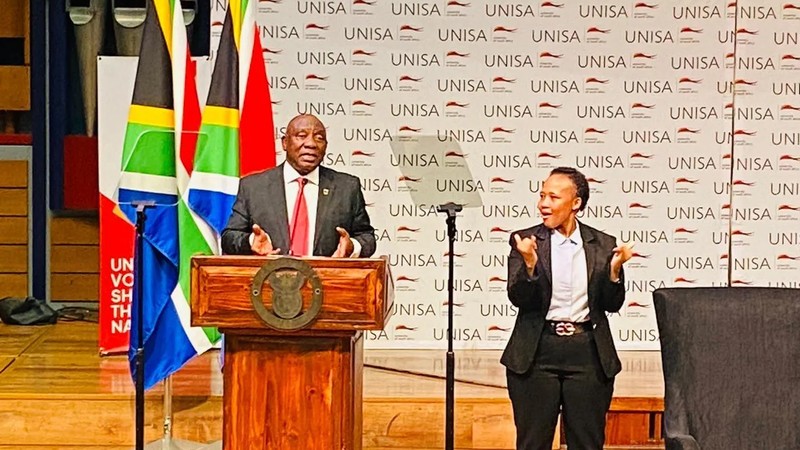Following the first convention of the National Dialogue in Pretoria from August 15 to August 16, 2025, the General Industries Workers Union of South Africa (GIWUSA) has condemned the process labeling it a talk shop that cannot resolve the crisis of capitalism.
Giwusa said this is a spectacle of grim irony, as the 16th also marked the 13th anniversary of the Marikana Massacre, where the state slaughtered 34 mineworkers for daring to demand a living wage.
Giwusa president, Mametlwe Sebei said: “In this first post-apartheid bloody massacre, the state acted on the incitement of none other than the convener of this National Dialogue, Cyril Ramaphosa, who was the director of Lonmin at the time.”
Sebei said this gathering was masquerading as the assembly of the representatives of all sectors of South African society to agree on the process of the national dialogue that will reflect and provide solutions to the deep-seated crises in the country.
According to Sebei this was no more than a talk shop, far from constituting an authoritative political assembly, widely boycotted by all main opposition parties, in and out of the GNU, many trade unions, community civics, and youth movements.
“It was constituted by all sorts of self-appointed place seekers, including hopeless xenophobes from Operation Dudula, NGOs, sprinkles of community civics, unionists, academics, and a significant number of Cabinet members and public servants. remarked Sebei
Expressing the union’s vote of no confidence in the process, Sebei said: “In its essence, it was an empty spectacle designed to create the illusion of engagement while preserving the power over the process in the hands of the political elite, and the very system of monopoly capitalism that has brought our people to ruin.”
According to Sebei, the problems confronting South Africa do not emanate from the lack of engagement but from policies and the people in positions of state power.
“The political contradictions and polarisation tearing South Africa apart are not the result of a lack of dialogue but are rooted in the objective class divisions of our society.
Under capitalism, where the private ownership of the economy and land is monopolised, the interests of the wealthy elite who seek ever-greater profits over their monopolised private property in the economy are directly opposed to those of the working class, who fight for survival, decent wages, and a dignified life. No amount of discussion can reconcile these opposing class aspirations.”
The crises we face are the direct results of four decades of neoliberal policies imposed by the capitalist class to protect their profits at the expense of the people. Since the crisis of capitalism began in the 1970s, the ruling class has responded with privatisation, austerity, and attacks on workers all to maintain their wealth while the majority suffer, remarked Sebei.
ActionSA also came out with similar sentiments citing that government missed an opportunity to provide a clear way forward and instead turned this convention into a stage-managed talk shop, heavy on rhetoric and empty on solutions.
ActionSA’s Member of Parliament, Lerato Ngobeni said: “The lack of proper organization was glaring from the outset. It soon became clear that Ramaphosa’s convention was nothing more than a venting session without answers, met with youth rejection and no plan to confront corruption.”
Ngobeni characterized this convention as non significant and a doomsday effort: “From the start, President Cyril Ramaphosa’s weak and uninspired remarks set the tone for what became a complaints session masquerading as a national renewal project.
Citizens once again listed the failures of the State, but this time, with no pathway to solutions.”
Ngobeni cried that this is not a legitimate dialogue: “A dialogue that refuses to confront corruption is dishonest and incomplete. The withdrawal of respected legacy foundations underscores the lack of credibility in this process.”
“Most shockingly, there was no dedicated stream on corruption, the very cancer hollowing out South Africa’s democracy and destroying public trust.”
The inclusion of political parties also raises serious concerns, with only one party elevated to the steering committee will entrench partisan advantage instead of genuine multiparty collaboration despite the ANC displaying a willingness not to be part of the political party steering committee representative.
Ngobeni warned that the national dialogue runs a big risk of not yielding results, even comparing it to the Freedom Charter as adopted in 1995 citing that without a binding framework, South Africans will again be left with empty promises written on borrowed paper.
Putting emphasis on the urgent need for change and transformation, Ngobeni said: “South Africans don’t need another talk shop and venting session. They need leadership with the courage to define the destination, chart the roadmap, and deliver on it. Until then, this National Dialogue will remain pure political theatre heavy on words but bankrupt on action.”
News
Get your news on the go, click here to join the News WhatsApp channel.
